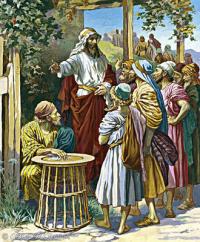
Jesus told many parables to describe his heavenly Father. It is all too easy to attribute human qualities to God like those of a stern judge, a tyrannical king or a teacher assigning grades. Much harm has been done by Christians when they think in human terms: the Crusades, the Inquisition and the Magdalene Laundries spring to mind. Last week we saw a story of a king who forgave an enormous debt. This week we see a picture of one who gave the same treatment to everybody.
The landowner had agreed the normal rate for a day’s work which was one denarius. This was the contract for all the workers in the vineyard whether they worked a full day or just for one hour. The chosen people, the Jews and particularly their leaders, would have seen themselves superior to other nations. However - as Peter discovered in Acts 10:34 when he met the centurion Cornelius - God has no favourites, and latecomers are just as welcome as those who heard the word earlier. John Newton, who had been involved in the slave trade for much of his life, repented, became a clergyman and supported William Wilberforce in the abolition of the slave trade. He was the author of “Amazing Grace”.
People have a variety of gifts and are called to serve God in many different ways. Therese of Lisieux would have liked to be a priest but realised this was not possible. She came to the understanding that God had called her to the vocation of love, and she did everything she could to please him in this way rather than resenting the fact that she could not be ordained.
“A religion that is small enough for our understanding is not great enough for our needs” (Arthur Balfour, quoted by the late Bishop Martin Drennan in Turning Wounds into Wisdom).